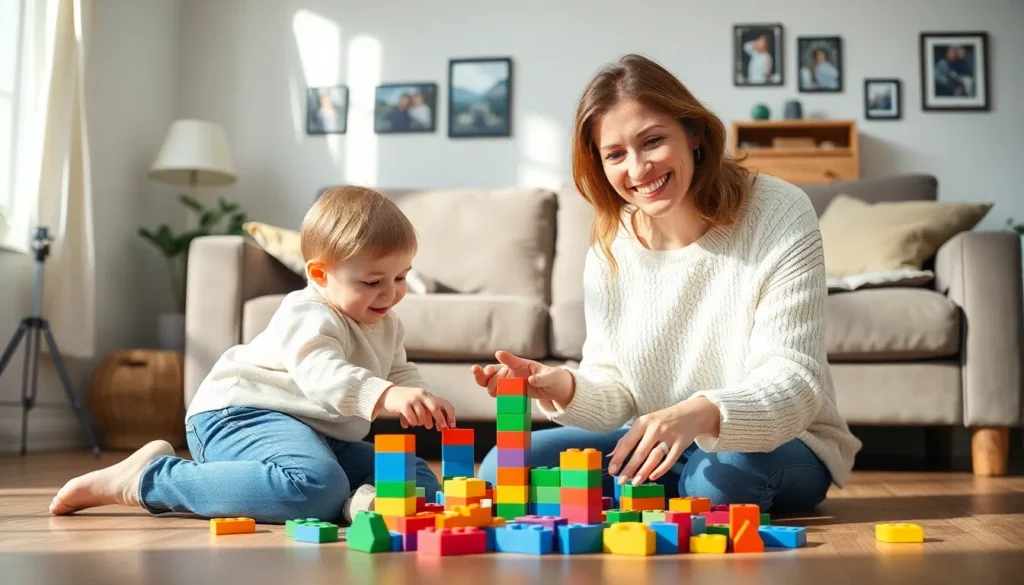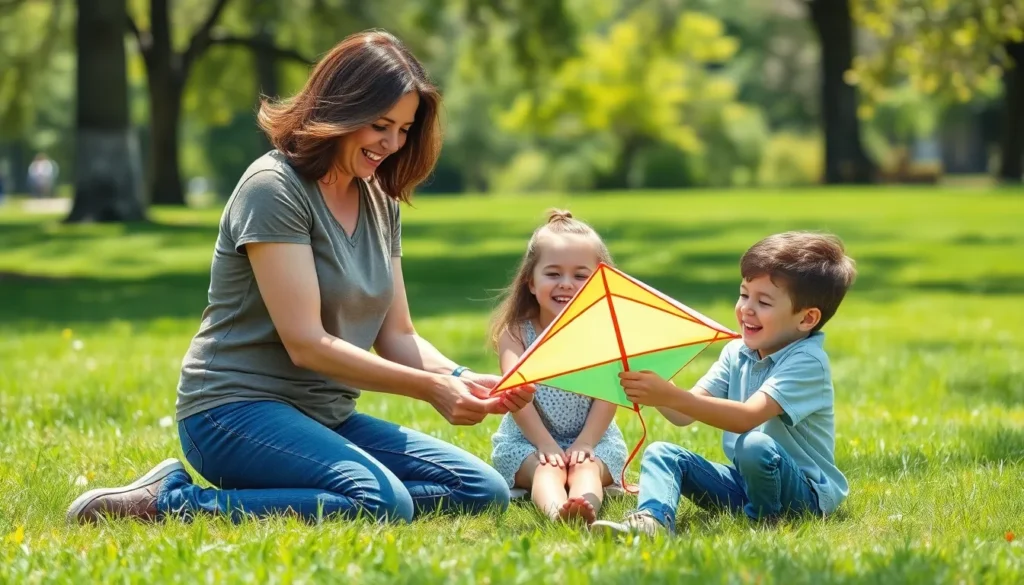Table of Contents
ToggleParenting can feel like a circus act, but what happens when you’re the only performer in the ring? Solo and single parenting both come with their unique challenges and rewards, but they’re not quite the same. While one might juggle everything alone, the other might have a partner in crime—albeit one that’s not always around.
In this article, we’ll dive into the delightful chaos of solo vs single parenting. From the joys of being the sole decision-maker to the occasional meltdown over missing socks, understanding these styles can help clarify the parenting landscape. So grab your favorite snack and buckle up, because whether you’re flying solo or navigating the single-parent rollercoaster, there’s plenty to laugh about and learn.
Understanding Solo Vs Single Parenting
Solo parenting and single parenting represent distinct parenting paths. Both involve unique challenges and rewards that shape the family dynamic.
Definitions of Solo Parenting
Solo parenting refers to the situation where one parent takes on the full responsibility of raising a child without a partner’s support. This can occur through choice or circumstances, such as after a divorce, separation, or the loss of a partner. Solo parents act as the sole decision-makers, balancing work, household duties, and child-rearing. Emotional connections between parents and children can deepen in this arrangement. They experience both the joys and burdens of parenting alone. Solo parenting often emphasizes independence and resilience in navigating life’s challenges.
Definitions of Single Parenting
Single parenting typically describes an unmarried individual caring for a child. This could arise from unplanned pregnancies or relationships that did not lead to marriage. Single parents often share custody with an ex-partner, creating a co-parenting dynamic. This approach encourages collaboration between parents, even if they live separately. They frequently face unique pressures associated with managing time and resources. Financial strains and childcare responsibilities can influence daily life significantly. Single parenting highlights the importance of balancing personal and familial needs amidst the demands of parenting.
Key Differences Between Solo And Single Parenting

Solo parenting and single parenting differ significantly in structure and support. These differences impact the experiences of each parenting style.
Support Systems
Solo parents typically face a lack of external support, relying solely on their own resources. They manage daily tasks without help from a partner or co-parent. Emotional connections often deepen with children, creating a unique bond. Single parents commonly share custody, allowing for some level of collaboration with an ex-partner. This dual arrangement can offer practical and emotional support, but it may also lead to conflicts and negotiation challenges. Many single parents benefit from child exchanges and shared activities, adding layers of social interaction. The extent of support systems can determine how each type of parent responds to stress and parenting challenges.
Parenting Responsibilities
Parenting responsibilities vary in intensity between solo and single parenting. Solo parents shoulder all daily duties and decision-making, from discipline to education. This exclusive responsibility fosters independence and strong personal development. Single parents split responsibilities, potentially easing the burden of parenting tasks. They juggle commitments alongside their co-parent, which might lead to negotiation over schedules and responsibilities. Balancing work and family can be particularly challenging for single parents, requiring effective time-management skills. Knowing how to navigate these responsibilities shapes the family’s overall dynamics and the child’s growth.
Emotional Impact On Children
Children raised in solo or single parent households experience unique emotional impacts. These differences often stem from varying parenting dynamics and the support structures available.
Developmental Considerations
Developmental outcomes can vary significantly based on parenting style. Solo parenting often fosters independence in children due to the lack of external support. Children in these households may develop strong self-reliance and resilience. A study from the American Psychological Association noted that these children frequently showcase enhanced problem-solving skills. Single parenting introduces shared responsibilities among parents, which can aid in emotional stability. When chosen parents communicate effectively, children benefit from reduced anxiety and a balanced emotional environment.
Emotional Well-Being
Emotional well-being represents a critical area affected by parenting styles. Solo parents typically build strong emotional ties, encouraging children to express their feelings openly. These connections often create secure attachments, leading to improved self-esteem. Single parents, however, may face emotional challenges tied to co-parenting disagreements. Conflicts can sometimes cause stress in children, resulting in anxiety or behavioral issues. By maintaining clear communication and collaborative parenting strategies, single parents can mitigate these negative effects. Fostering a supportive environment remains essential for emotional health across both parenting styles.
Challenges Faced By Solo And Single Parents
Solo and single parents encounter a range of challenges impacting their ability to navigate daily life effectively.
Financial Struggles
Financial strains present a significant challenge for both solo and single parents. Limited income often forces them to stretch every dollar. Job security can be a constant worry, especially for solo parents who bear full financial responsibility. Single parents frequently juggle child support and their own expenses, adding pressure to manage finances effectively. Many struggle to cover childcare costs, which can consume a large portion of their budget. With limited resources, expenses accumulate quickly, leading to stress and anxiety. Accessing community support programs or resources may provide some relief, yet not all parents are aware of their availability.
Social Isolation
Social isolation affects both solo and single parents in distinct ways. Solo parents often experience feelings of loneliness since they lack a partner for emotional support. They may find it difficult to connect with friends due to their busy schedules. Single parents might face similar issues, especially if co-parenting dynamics create tension or misunderstandings. Attending social events becomes challenging for both groups, as coordinating childcare adds complexity. Community resources or parent groups can help alleviate these feelings. Engaging with other parents can foster connections, ultimately improving emotional well-being. Finding support in shared experiences creates a network that strengthens resilience.
Support Strategies For Solo And Single Parents
Both solo and single parents benefit from support strategies that enhance their parenting experience. Establishing connections proves essential for emotional well-being.
Building A Support Network
Creating a robust support network significantly aids solo and single parents. Friends provide companionship, while family members often offer practical help. Local community groups facilitate social interaction and advice exchange. Online forums connect parents with similar experiences, building a sense of belonging. Engaging in co-parenting groups can enhance communication and reduce conflicts. Collaborative efforts with an ex-partner promote shared responsibilities, easing financial and emotional burdens. Prioritizing these relationships helps strengthen resilience in both parents and children.
Self-Care Practices
Prioritizing self-care becomes crucial to managing the demands of parenting. Setting aside time for personal interests fosters mental health. Exercise serves as a stress reliever while promoting physical fitness. Practicing mindfulness can improve emotional regulation and clarity. Connecting with fellow parents offers opportunities for shared experiences, reducing feelings of isolation. Exploring hobbies provides a constructive outlet for creativity. Fostering healthy eating habits ensures sustained energy levels throughout the day. Implementing these self-care practices enhances overall well-being for both solo and single parents.
Navigating the journey of parenting can be complex whether one is a solo or single parent. Each style brings its own set of challenges and rewards that shape the family dynamic. The strength of emotional bonds in solo parenting contrasts with the collaborative efforts seen in single parenting.
Both paths require resilience and adaptability to overcome financial strains and social isolation. Building a strong support network and prioritizing self-care can significantly enhance the well-being of both parents and children. Ultimately the focus should remain on fostering a nurturing environment that promotes emotional health and growth for everyone involved.






